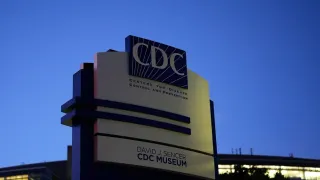
4 hours ago
Springer's Homer Sends Blue Jays Into World Series With 4-3 Win Over Mariners in Game 7 of ALCS
Ian Harrison READ TIME: 4 MIN.
Woah, Canada! After a huge swing by George Springer, the World Series is headed north of the border for the first time in 32 years.
Springer hit a go-ahead, three-run homer in the seventh inning and the Toronto Blue Jays won their first pennant since 1993 by beating the Seattle Mariners 4-3 in Game 7 of the American League Championship Series on Monday night.
Vladimir Guerrero Jr. and the Blue Jays will host Shohei Ohtani and the Los Angeles Dodgers in Game 1 on Friday when the Fall Classic comes to Canada for the third time.
“The job’s not finished. We got four more to go,” said Guerrero, the ALCS MVP.
The defending champion Dodgers completed a four-game sweep of Milwaukee in the NLCS last week.
“I truly think that the best two teams are left standing,” Toronto manager John Schneider said.
Cal Raleigh and Julio Rodríguez each hit a solo home run for Seattle in the team’s first postseason Game 7, but the heartbroken Mariners squandered a 3-1 lead in the seventh and fell eight outs short of their first World Series appearance.
“I hate to use the word failure, but it’s a failure,” Raleigh said. “What we expected was to get to the World Series and win a World Series. That’s what the bar is and the standard is and that’s what we want to hold ourselves accountable to.”
Seattle remains the only major league club without a pennant.
“There’s no question that it’s going to sting,” manager Dan Wilson said. “It’s a special team in there. It’s a shame that we had to come out on the wrong side of this one.”
Addison Barger walked to begin the seventh, Isiah Kiner-Falefa singled on an 0-2 pitch and Mariners right-hander Bryan Woo was removed after No. 9 batter Andrés Giménez advanced the runners with a sacrifice bunt.
Springer, the 2017 World Series MVP for Houston, greeted Eduard Bazardo with his fourth homer this postseason, a 381-foot drive to left field that sent the sellout crowd of 44,770 into a roaring, pulsating frenzy.
“It’s so fitting,” Schneider said. “Bottom of our order gets it done again. There’s probably not another person on planet Earth that I want up other than George Springer and his October magic.”
It was the first go-ahead homer in Game 7 history when a team trailed by multiple runs in the seventh inning or later.
And it was the 23rd career postseason homer for Springer, tying Philadelphia Phillies slugger Kyle Schwarber for third place. Manny Ramírez holds the major league record with 29.
“Unbelievable moment,” Springer said. “So happy for our team, our fans, our city, our country."
Toronto became the fourth team to lose the first two games in a best-of-seven postseason series at home and rebound to win. The others were the 1985 Kansas City Royals, 1986 New York Mets and 1996 New York Yankees — all in the World Series.
“I think it’s an inspiration for 41 million people in Canada, from coast to coast to coast,” Blue Jays chairman Edward Rogers said. “This is Canada’s team.”
Making his first relief appearance since the 2021 playoffs, Kevin Gausman worked around three walks in a scoreless seventh inning to earn the win.
Fellow starter Chris Bassitt tossed a perfect eighth and Jeff Hoffman struck out all three batters in the ninth for his second save this postseason.
Rodríguez opened the game with a double and scored on a one-out single by Josh Naylor. Daulton Varsho tied it with an RBI single off George Kirby in the bottom half before Rodríguez restored the lead for Seattle with a leadoff homer in the third.
Raleigh, who led the majors with 60 homers in the regular season, made it 3-1 with a leadoff homer against Louis Varland in the fifth.
Raleigh has 10 home runs in 15 career games at Rogers Centre, three of them in the postseason. He also homered at Toronto in Game 1 of a 2022 Wild Card Series and Game 1 of this year’s ALCS.
Naylor was called out to end the first after umpires ruled he interfered with Ernie Clement’s relay to first base on a double play by jumping into the throw and deflecting it.
Kirby allowed one run and four hits in four innings. He walked one and struck out three.
Toronto starter Shane Bieber permitted two runs and seven hits in 3 2/3 innings. He walked one and struck out five.
The Blue Jays were playing in a Game 7 for the first time since losing at home to Kansas City in the 1985 ALCS.
The 26-year-old Guerrero, born in Montreal, arrived at the stadium wearing a Toronto Maple Leafs hockey jersey with Auston Matthews’ name and number. The star forward is 0-6 in Game 7s with Toronto during his 10 NHL seasons.
“I think Vladdy broke the curse,” Schneider joked.
The Blue Jays’ victory also put 64-year-old bench coach Don Mattingly in the World Series for the first time after a long career in baseball. The former New York Yankees captain, a six-time All-Star and the 1985 AL MVP, managed the Dodgers from 2011-15.
Up next
The Dodgers are in the World Series for the fifth time since 2017 and are chasing their third championship in six years. Toronto’s only appearances resulted in back-to-back titles in 1992 and ’93.
The AL East champion Blue Jays hold home-field advantage and will host the opener because they finished the regular season with 94 wins, one more than the NL West champion Dodgers.






